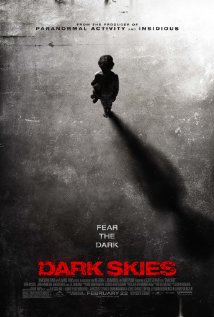As a sub-genre of
science fiction and horror, alien abduction films will always be here to fill a
niche. Whether they are under a fictional guise (Signs) or marketed as a true story (Communion), the ever pervading fear of a genuine unknown entity
entering a domestic setting seems to be a notion as ancient as the stories
themselves. Ranging from the primeval folklore tales of succubus and incubus to
the modern phenomenon of ‘the Grays’ coming into our collective consciousness
in the latter part of the twentieth century, there is no shortage of
descriptive physical characteristics and theories as to who they are or what
motives compel them to engage with the human species. In Dark Skies, writer/director Scott Stewart takes an average American
family and subjects them to his own dark interpretation of a modern alien
encounter.
When the movie first
came to my attention, I thought it was perhaps a film version of the
eighteen-episode science fiction series that debuted in the late nineties,
riding on the coat-tails of a certain successful show called The X-Files. Thankfully, this wasn’t the
case – and a quick perusal of the director’s previous forays into cinema
revealed someone who (although achieving questionable results in the past with Legion), was looking to be setting up
shop in the horror genre, but had yet to hit his stride or find quite the right
project to call home. However, despite a few problems - mainly due to the
unoriginality of the story – it seems Dark
Skies as a working whole will win some critics over and give the director just the kind of clout he needs to branch out in future endeavors.
The Barnett family are
white, middle-class suburbanites. Their existence is mundane if relatively
happy. Lacy (Keri Russell) works as real estate agent and although an
unemployed architect her husband (Daniel) is optimistic about his future. Their
two sons, Jessie and Sammy, communicate at night through a set of
walkie-talkies in separate bedrooms. Soon, the family experiences some common
tropes of poltergeist activity: fridges are raided, furniture is rearranged,
and in one instance the entire mosaic of their photo collection is filched with
the frames entirely intact. The authorities are sought, but with no hard
evidence, Daniel takes matters into his own hands by putting the house under
surveillance with security cameras. When the terrors escalate into missing
time, implants, and the manifestations of otherworldly creatures on camera, it
soon becomes apparent the events are merely a precursor to a countdown or
‘final moment’ of unknown agenda.
It all sounds a tad
formulaic, doesn’t it? And (at least on paper), I’d agree. However, there is a
simple ambiance in Dark Skies that
works. The soundtrack is used sparingly and sometimes not at all; silence
itself becomes a sound. When each member of the family experiences dangerous
fugue states, all actors (including the children) give credible performances
that give the whole outing a genuine feeling of unease.
Lastly, it should be
noted there are more than a few similarities between this movie and M. Night
Shyamalan’s Signs. Whereas one dealt
with the alien abduction phenomenon in a rural setting, this one transports us
to an urban environment - and ultimately we have the same mixed results. If
anything, Scott Stewart proves he has learned one important lesson from the
successful director who tackled the subject matter before him: that in any
suspense film, no matter the size of your budget, the biggest scares always come
from what is suggested ... and not from what is shown.

